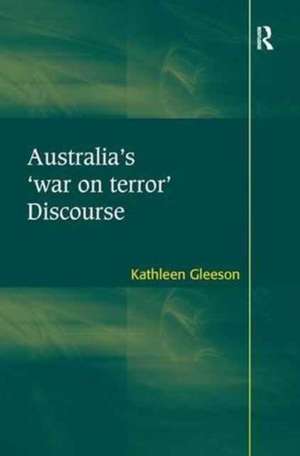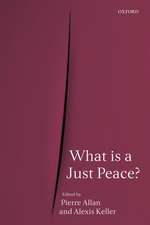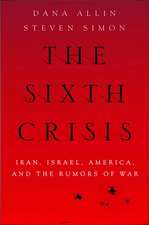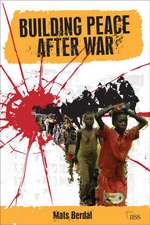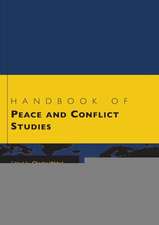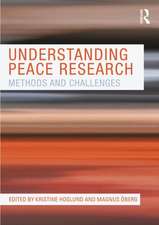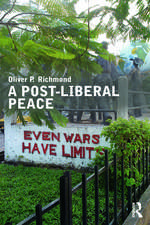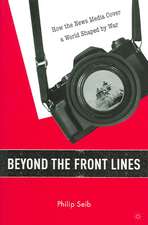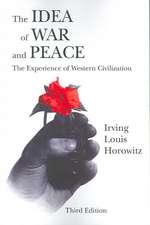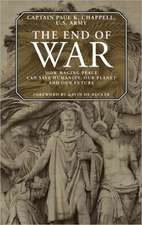Australia's 'war on terror' Discourse
Autor Kathleen Gleesonen Limba Engleză Paperback – 28 noi 2016
| Toate formatele și edițiile | Preț | Express |
|---|---|---|
| Paperback (1) | 469.34 lei 6-8 săpt. | |
| Taylor & Francis – 28 noi 2016 | 469.34 lei 6-8 săpt. | |
| Hardback (1) | 1113.63 lei 6-8 săpt. | |
| Taylor & Francis – 28 iun 2014 | 1113.63 lei 6-8 săpt. |
Preț: 469.34 lei
Nou
Puncte Express: 704
Preț estimativ în valută:
89.81€ • 93.77$ • 74.33£
89.81€ • 93.77$ • 74.33£
Carte tipărită la comandă
Livrare economică 04-18 aprilie
Preluare comenzi: 021 569.72.76
Specificații
ISBN-13: 9781138272026
ISBN-10: 1138272027
Pagini: 286
Dimensiuni: 156 x 234 mm
Greutate: 0.45 kg
Ediția:1
Editura: Taylor & Francis
Colecția Routledge
Locul publicării:Oxford, United Kingdom
ISBN-10: 1138272027
Pagini: 286
Dimensiuni: 156 x 234 mm
Greutate: 0.45 kg
Ediția:1
Editura: Taylor & Francis
Colecția Routledge
Locul publicării:Oxford, United Kingdom
Notă biografică
Kathleen Gleeson is an independent researcher and writer. She holds a PhD in Politics and International Relations from the University of New South Wales, Australia and a Bachelor of Arts with Honours from the University of Newcastle, Australia. Her research interests are in political discourses and social change, political theory, democratic participation and international political systems.
Recenzii
"For scholars examining the causes of radicalization in Australia or those simply interested in the effects of certain narratives in national security policy making, Gleeson’s book is a must read. It should be equally appealing to those thinking about Australia’s current government politicking on terrorism because the further one reads Gleeson’s examination of Howard’s stance on national security and terrorism the more one sees history repeating itself."
Clarke Jones, Australian National University, Canberra, Australia, Pacific Affairs
’Australia’s ’war on terror’ Discourse is the first systematic study of Australia’s involvement in the global war on terror. Theoretically sophisticated, empirically insightful and eloquently argued, it examines how the war on terror discourse spread to Australia and its consequences for Australian foreign and domestic politics. For anyone wanting to understand how the war on terror functions internationally or the present state of Australian politics, this book is a must-read and a welcome addition.’
Richard Jackson, University of Otago, New Zealand
’This excellent book stands out as the fullest critical analysis of Australian foreign policy discourse in the War on Terror. Developing a specific variant of Critical Discourse Analysis and weaving together the ideas of a range of critical scholars, Gleeson delivers a sustained deconstruction of John Howard’s foreign policy. It will be of great interest to scholars and students of foreign policy and the War on Terror in Australia and beyond.’
Jack Holland, University of Surrey, UK
’Gleeson offers an incisive account of the construction of Australia’s post-9/11 War on Terror discourse. Her analysis of its architects and architecture provides the first detailed history of this unprecedented era in Australia’s security policy. In doing so, she also provides a compelling case for the centrality of discourse analysis in global security studies.’
Katrina Lee-Koo, Australian National University, Australia
’This theoretically sophisticated book does not only provide the best in-depth analysis of how the war on terror discourse was constructed in Australia. Its innovative combination of Foucauldian genealogical analysis and Critical Discourse Analysis also forges a powerful methodological tool that can provide major insights into how that discourse was constructed internationally.'
Carol Johnson, The University of Adelaide, Australia
Clarke Jones, Australian National University, Canberra, Australia, Pacific Affairs
’Australia’s ’war on terror’ Discourse is the first systematic study of Australia’s involvement in the global war on terror. Theoretically sophisticated, empirically insightful and eloquently argued, it examines how the war on terror discourse spread to Australia and its consequences for Australian foreign and domestic politics. For anyone wanting to understand how the war on terror functions internationally or the present state of Australian politics, this book is a must-read and a welcome addition.’
Richard Jackson, University of Otago, New Zealand
’This excellent book stands out as the fullest critical analysis of Australian foreign policy discourse in the War on Terror. Developing a specific variant of Critical Discourse Analysis and weaving together the ideas of a range of critical scholars, Gleeson delivers a sustained deconstruction of John Howard’s foreign policy. It will be of great interest to scholars and students of foreign policy and the War on Terror in Australia and beyond.’
Jack Holland, University of Surrey, UK
’Gleeson offers an incisive account of the construction of Australia’s post-9/11 War on Terror discourse. Her analysis of its architects and architecture provides the first detailed history of this unprecedented era in Australia’s security policy. In doing so, she also provides a compelling case for the centrality of discourse analysis in global security studies.’
Katrina Lee-Koo, Australian National University, Australia
’This theoretically sophisticated book does not only provide the best in-depth analysis of how the war on terror discourse was constructed in Australia. Its innovative combination of Foucauldian genealogical analysis and Critical Discourse Analysis also forges a powerful methodological tool that can provide major insights into how that discourse was constructed internationally.'
Carol Johnson, The University of Adelaide, Australia
Cuprins
Introduction; Chapter 1 Analysing the ‘war on terror’ Discourse; Chapter 2 Interpretation: Response; Chapter 3 The Architecture of the Discourse; Chapter 4 Australia’s ‘war on terror’: Phase One; Chapter 5 Australia’s ‘war on terror’: Phase Two; Chapter 6 A Genealogy of Dissent; conclusion Conclusion From Self to Other;
Descriere
Too often, existing literature has conflated the discourses that enabled the 'War on Terror', ignoring the contextual specificities of the states that make up the ’Coalition of the Willing’. Australia's 'war on terror' Discourse fills this gap by providing a full and sustained critical analysis of Australian foreign policy discourse along with the theoretical synthesis for a specific model of critical discourse analysis of the subject.
